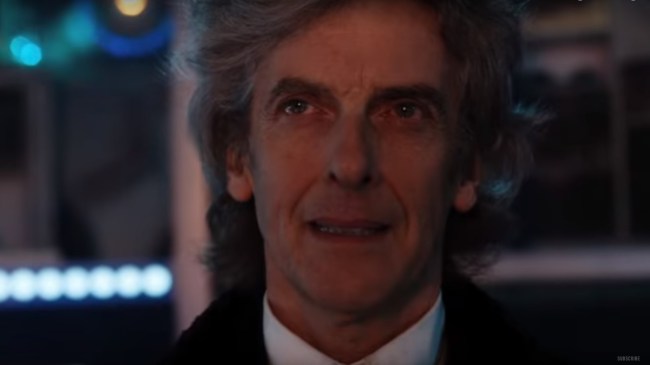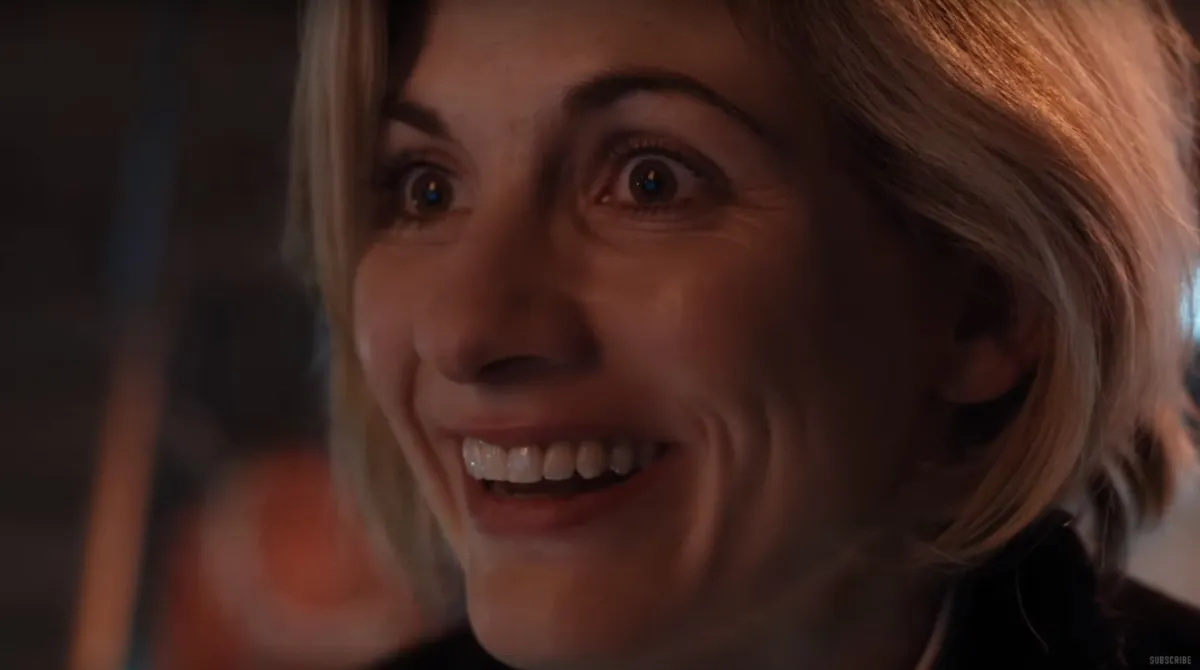This year’s Doctor Who Christmas special was thrilling for several reasons. We got to watch the Twelfth Doctor interact with the First Doctor (brought beautifully to life again by David Bradley). We witnessed the moment where the Doctor preserved a very important future relationship. But perhaps the most thrilling thing of all is that, in regenerating into their thirteenth form, the Doctor is now a woman. The best part? The Doctor seems pretty damn happy about it.
I mean, seriously, look at that smile in the image above when she first sees herself!
We’ve all known this was coming since Jodie Whittaker was cast in the role back in the summer, but as Kaila pointed out in her post about the Doctor’s most recent regeneration, seeing it finally happen is something else entirely. While Steven Moffat wrote the Christmas special, new Doctor Who showrunner, Chris Chibnall is credited with writing the Thirteenth Doctor’s regeneration scene, and thank goodness for that. Because this is what happens when Moffat imagines a female Doctor:
Yes, yes. I know it was a parody sketch for Red Nose Day eons ago. I know it’s “supposed to be funny.”
Yet, it “being funny” relies entirely on the fact that 1) the female companion is only interested in the Doctor as a romantic partner, not because she, I don’t know…likes having adventures, or whatever. Ha-ha. 2) the new Doctor’s first concern is with her own breasts (and, of course, she has a cleavage-bearing top) and the supposedly brilliant Doctor insists they’re something else entirely rather than accept the simple (and more obvious) fact that she’s a woman. Ha-ha. 3) The Master’s first order of business when his nemesis turns into a woman is to try and bang her, while making a lewd comment about being “the Master” in the process. Ha…ha?
In other words, one has to find sexist humor funny in order to enjoy this.
Now, I believe that Steven Moffat, for all his problems with writing women, has come a long way since 1999, when he did this sketch. I don’t think if he had it all to do over again, it would be quite this bad. And I don’t think it’s an accident that, in writing “Twice Upon a Time,” the final episode of his tenure as Doctor Who‘s showrunner, that he has the most current Doctor calling out the First Doctor about his sexist comments. What’s more, he hired a female director in Rachel Talalay, to bring this Doctor home.
Peter Capaldi’s Twelve spends much of the episode asking the First Doctor to “stop saying things like that,” whenever the First Doctor would allude to female companions keeping the TARDIS clean, or having “experience with the fairer sex” (Bill’s response here is priceless). Twelve is clearly mortified by his first self, and it’s fitting that just before his regeneration, he imparts all the lessons he’s learned about what he believes the Doctor should be.

He places emphasis on love being wisdom. On being kind. On having a special relationship with children. And ultimately, on letting go. While I hate gendering characteristics, the fact is that many of these things, not to mention being emotionally articulate enough to be able to identify these things as important and valuable, have historically been considered feminine. Not necessarily meaning that all or only women have them, but that the characteristics themselves are feminine, no matter who has them.
Twelve has had twelve regenerations (counting the War Doctor) to figure all of this out, and there’s been a lot of sexism scattered throughout those lifetimes. Obviously, this has a lot to do with the times during which each Doctor was being written, but that’s kind of the point, isn’t it? Each generation gets the Doctors they need. The Doctors that reflect where they are.
After the 2005 reboot and the Ninth Doctor, Doctor Who got better about its treatment and view of women. Martha was the first human companion since Liz Shaw, and the first companion period since the Romanas, that was valued intellectually. Donna was the first true friend the Doctor ever had that wasn’t treated like a child, or like a love interest.
That said, a romantic element between companion and Doctor was amped up and made a focus in New Who in a way it hadn’t been before. And when Ten regenerated into Eleven, in the split second where Eleven though he might be “a girl,” he panicked as if it would’ve been terrible. Companions and Doctors aside, we had problematic women like River Song and Madame Vastra and Jenny, who were on the one hand extremely progressive, and on the other hand still handled in a sexist way.
But there was evolution happening, both for the Doctor and, I believe, for Moffat.
So, we get to Twelve…and he finally, truly gets it. He gets the ways in which he’s been historically sexist, and how that was awful and offensive. He gets that things like love, kindness, and children are important for everyone, not just for women or in specific instances, but all the time, everywhere. That the way to be the best Doctor he can be is to always embrace those things.
He also finally understands that there’s a time to fight, and there’s a time to let go, and he’s the first Doctor to really say that out loud. The Doctor’s previous regenerations have all had some element of stress or defiance about them. When he has expressed being “ready” to go, it’s generally been for the benefit of weeping companions watching the regeneration happen, to comfort them. Yet, when he’s been alone, Ten captured it pretty well. His attitude is, “I don’t want to go.”
Twelve, all alone with no one watching, willingly and serenely lets the Doctor go, and it’s a beautiful and powerful moment.
And so, it makes sense that this Doctor is the Doctor to “level up,” so to speak. It makes sense that Thirteen looks at herself, and is absolutely, unconditionally happy with what she sees. “Ah, brilliant!” she says, beaming, seeing this as the perfect continuation of a life. Seeing being a woman as the logical next phase in the Doctor’s evolution. She doesn’t even care about not being “ginger,” she’s so happy.
And Moffat, by sprinkling in the Doctor’s self-criticism and lessons learned, by allowing Talalay to work with Capaldi on a soft, calm, nuanced performance rather than insisting on directing this final episode himself, has as much to do with the inevitability of a female Doctor as Chris Chibnall does in writing her first appearance.
Problems aside, I’ve always been a Moffat fan overall, and I will always be grateful to him for this: an acknowledgement that Doctor Who, and the world, are ready for a female Doctor; a seeming acknowledgment of his own shortcomings, knowing he might not be the best person to bring this Doctor to life, and allowing someone else to take the reins of this new Doctor who is so important to so many.
The future is, indeed, female, and I’m thrilled that the Doctor has finally gotten there.
(image: screencap)
Want more stories like this? Become a subscriber and support the site!
—The Mary Sue has a strict comment policy that forbids, but is not limited to, personal insults toward anyone, hate speech, and trolling.—









Published: Dec 27, 2017 04:27 pm